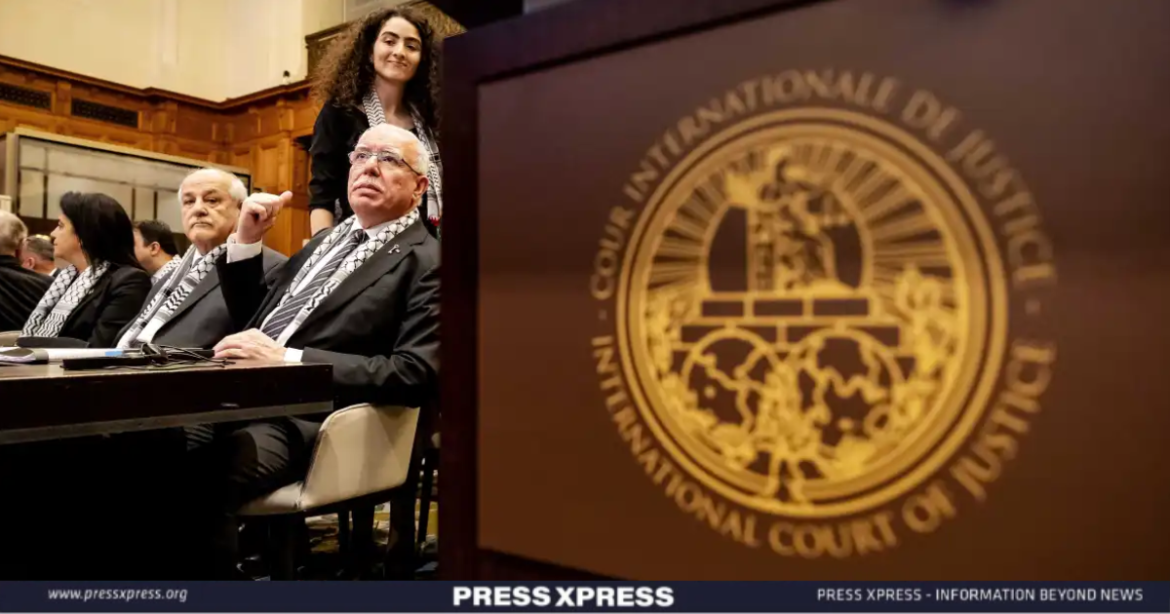The International Court of Justice (ICJ), the principal judicial organ of the United Nations, is set to open historic hearings on Monday, February 19, 2024, into the legal consequences of Israel’s 57-year occupation of the Palestinian territories.
The hearings, which are expected to last for six days, will involve oral arguments from more than 50 states and international organizations, as well as written submissions from the parties and interested parties.
You can also read: Guterres Urges Global Peace Revamp
The ICJ will then issue an advisory opinion, which is not legally binding but carries great moral and political weight, on the question posed by the UN General Assembly in 2022: “What are the legal consequences arising from the continued occupation by Israel of the Palestinian territory that was occupied by Israel since 1967, including East Jerusalem, and from its adoption of related discriminatory legislation and measures, in violation of international law, including the prohibition of territorial acquisition by force, the right of peoples to self-determination, and the prohibition of racial discrimination and apartheid?”
Background and History

The Israeli-Palestinian conflict dates back to the early 20th century when the Zionist movement sought to establish a Jewish homeland in Palestine, then under British mandate. The UN Partition Plan of 1947 proposed to divide Palestine into two states, one Jewish and one Arab but was rejected by the Arab states and the Palestinian leadership.
In 1948, Israel declared its independence and fought a war with its Arab neighbors, resulting in the displacement of hundreds of thousands of Palestinians and the occupation of 78% of historic Palestine by Israel.
In 1967, Israel captured the remaining 22% of Palestine, comprising the West Bank, including East Jerusalem, and the Gaza Strip, in the Six-Day War with Egypt, Jordan, and Syria. Since then, Israel has maintained a military occupation of these territories, in defiance of numerous UN resolutions and international law.

Israel has also built illegal settlements, roads, walls, and barriers in the occupied Palestinian territory, creating a fragmented and segregated reality for millions of Palestinians. The Palestinians have resisted the occupation through various means, including armed struggle, popular uprising, civil disobedience, diplomacy, and legal action.
Several attempts to reach a peaceful solution based on the two-state formula have failed, due to the lack of political will, mutual trust, and compliance by the parties. The situation has deteriorated further in recent years, with increased violence, human rights violations, humanitarian crises, and political deadlock.
Implications
The ICJ hearings on the legality of Israel’s occupation of Palestine have significant implications for the parties, the region, and the international community. For the Palestinians, the hearings represent an opportunity to seek justice and accountability for the violations of their rights and dignity under the occupation, and to reaffirm their right to self-determination and statehood.
For Israel, the hearings pose a challenge to its claim of sovereignty and security over the occupied Palestinian territory and expose it to international criticism and pressure. For the region, the hearings could have an impact on the prospects for peace and stability, depending on the reactions and responses of the parties and other actors.
For the international community, the hearings could provide guidance and clarity on the application and interpretation of international law, and the role and responsibility of states and organizations in ensuring its respect and enforcement.
Consequences for Israel
If the ICJ issues an advisory opinion that confirms the illegality of Israel’s occupation of Palestine and the violation of the Palestinians’ rights, Israel could face serious consequences, both legally and politically.
Legally, Israel could be held liable for reparations to the Palestinians for the harm and damage caused by the occupation and could be subject to sanctions and measures by the UN and other bodies for its non-compliance with international law.
Politically, Israel could lose its legitimacy and credibility in the eyes of the world and could face increased isolation and pressure from the international community to end the occupation and reach a just and lasting solution with the Palestinians.
What this means for Palestine
If the ICJ issues an advisory opinion that affirms the legality of Palestine’s right to self-determination and statehood, and the illegality of Israel’s occupation and annexation, Palestine could benefit from several advantages, both legally and politically.
Legally, Palestine could claim its sovereignty and jurisdiction over its territory and population and could seek recognition and admission as a full member of the UN and other organizations. Politically, Palestine could gain more support and solidarity from the international community and could leverage its legal position to negotiate a better deal with Israel, based on the principles of international law and human rights.
Conclusion
The ICJ hearings on the legality of Israel’s occupation of Palestine are a historic and unprecedented event, that could have a profound impact on the future of the Israeli-Palestinian conflict, and the fate of the two peoples. The court’s advisory opinion, although not binding, could serve as a catalyst for change, and a source of hope, for a peaceful and just resolution of one of the longest and most complex disputes in the world


